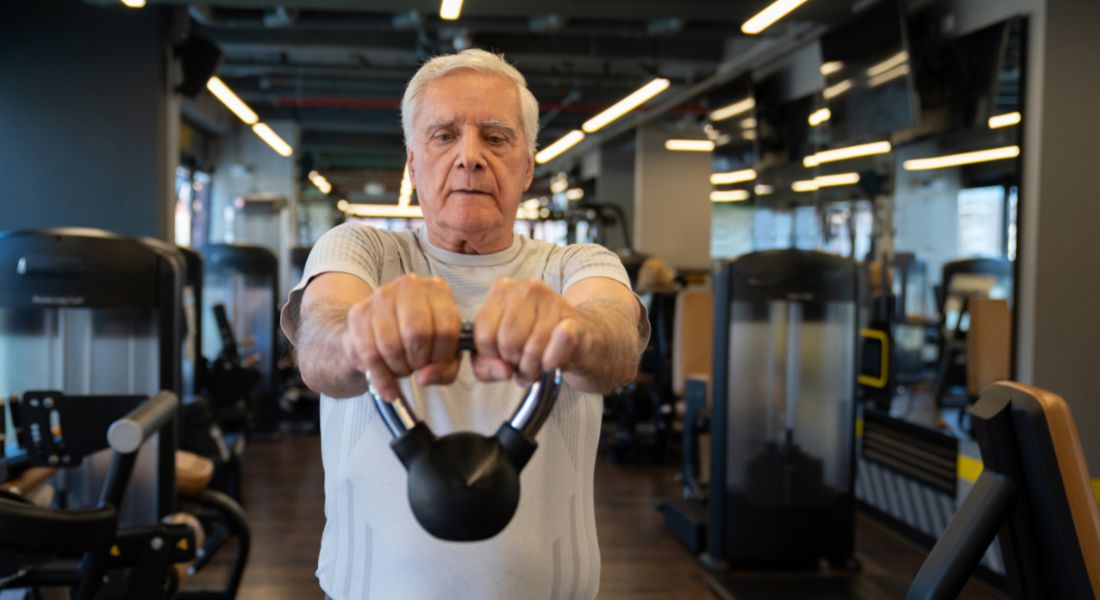Are you aged 40 or over? In that case, you need to do heavy weight training to keep fit
Heavy weight training can help make sure your nerves and muscles continue to work together, and it is never too late to get started. This is the conclusion of a new study from the University of Copenhagen.

This may sound familiar: Your back is beginning to twinge at the end of the day, your knees are hurting, or getting out of bed in the morning has become so much more challenging. As we age, so do our bodies, muscles and nerves. In fact, our muscle mass begins to decline even before we turn 40.
But even though we grow older, there is still a lot we can do to keep fit and make sure our muscles and nerves continue to work together. So says Postdoc Casper Søndenbroe, who is one of the researchers behind a new study from the Center for Healthy Aging at the University of Copenhagen.
“Our study shows that heavy weight training can strengthen the connection between the nerves in the spinal cord and the muscles. This will protect the body’s functional ability and reduce the risk of motor neuron death in the spinal cord, which is key to having a well-functioning body,” Casper Søndenbroe explains.
It is never too late – even if you are 65 or 70 years old. Your body can still benefit from heavy weight training
When you move, the brain sends a signal to some of the cells in the spinal cord, the so-called motor neurons, which pass the message on to the muscles and tell your body to move in a certain way. This is regardless of whether you are walking to the supermarket for milk, lifting a cup or running to catch the bus.
“Previously, researchers have been unable to prove that weight training can strengthen the connection between the motor neurons and the muscles. Our study is the first to present findings suggesting that this is indeed the case,” says Casper Søndenbroe.
It is never too late
As part of the study, a group of men around the age of 70 did heavy weight training three times a week for four months. Already halfway through the project, the participants saw significant improvements with regard to fitness and muscle size. These are positive results, Casper Søndenbroe argues.
“The study shows that even though you begin late in life, you can still make a difference. Of course, the sooner you start, the better, but it is never too late – even if you are 65 or 70 years old. Your body can still benefit from heavy weight training,” he stresses.
Weight training cannot prevent the gradual decline in fitness and connection between the muscles and nerves, though. It can only slop down the development. That is why it is important, according to Casper Søndenbroe, to begin to build up ‘reserves’ early in life to give you a head start as the body begins to age.
Weight training may prove important in the future
Even though gradual weakening of the muscles is a natural process, staying fit will become more and more important in the future. Because while the Danish population is ageing, life expectancy is increasing.
“We believe heavy weight training is one of the most effective forms of fitness training, regardless of whether you are young and old. Your muscles and physical strength will increase, which will help you manage yourself in everyday situations,” he says and adds that the extra years we get should be good ones.
“If your life increases by five years of reduced functional ability, I am not so sure you have gained anything. Those extra years should be characterised by well-being.”
The results of the new study are the first of their kind, and more research is required before we can establish how weight training affects the connection between the muscles and the nerves.
“Our results are a step on the way. Now we need to determine which specific mechanisms cause weight training to strengthen the connection to the nervous system. To do that, we need to introduce different methods, though our goal continues to be to make sure as many senior citizens as possible not only live longer, but also experience well-being,” says Casper Søndenbroe.
The study has been published in American Journal of Physiology: Cell Physiology and can be read here.
Contact
Postdoc Casper Søndenbroe
+ 45 51 27 24 07
casper.sondenbroe@sund.ku.dk
Journalist and Press Officer Sascha Kael Rasmussen
+45 93 56 51 68
sascha.kael.rasmussen@sund.ku.dk
